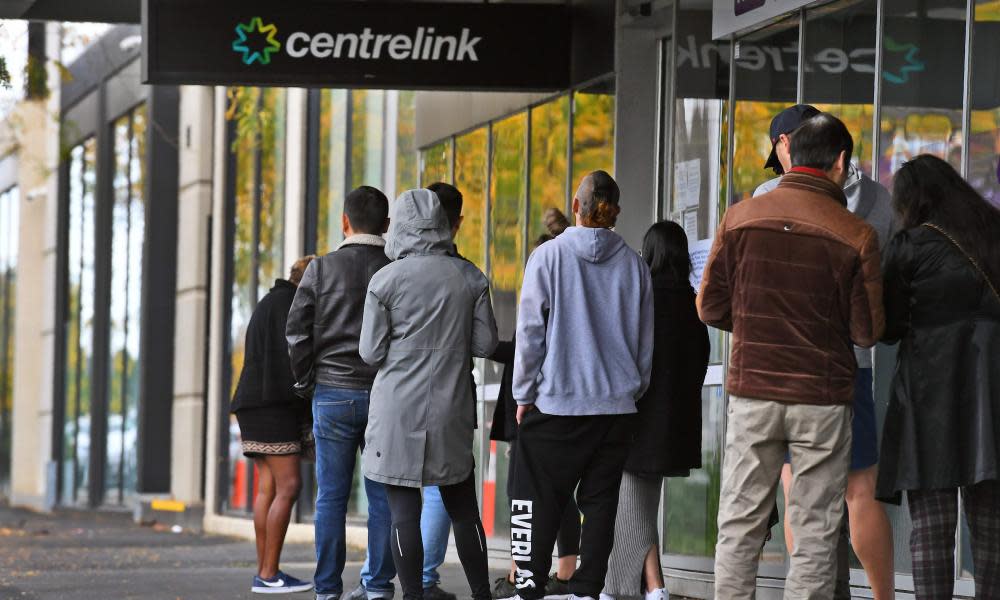Unemployment spikes and household spending slumps under Victoria's stage 4 restrictions

The number of people claiming unemployment benefits in Victoria has increased by 7.2% since the end of June, and household spending in the state has slumped during stage four restrictions, according to analysis from Treasury.
The new analysis comes as the Morrison government is working to develop guidelines for Covid-19 hotspots as part of an effort to persuade the states to end state border closures in favour of localised lockdowns.
While the Morrison government is now openly campaigning for state governments to reopen their borders, and is emphasising the accumulating economic costs of the lockdown in Victoria, the premier Daniel Andrews warned on Sunday infections would “explode” if the state eased restrictions too quickly.
Related: Australia's economic recovery has stalled – and it's not all because of Victoria | Greg Jericho
Andrews was criticised on Sunday by the treasurer Josh Frydenberg for failing to provide sufficient clarity about the transition out of stage four restrictions. “We’re only two weeks away from the end of the so-called stage four restrictions, and businesses are in the dark as to how they will get their workers back and their doors open,” the treasurer told Sky News.
“I want to hear more about a message of hope for the people of Victoria.”
But Andrews said the state needed to stay the course given the second wave of Covid-19 infections was now trending down.
Andrews said further guidance would be provided when the details were settled. He acknowledged lockdown was a frustrating time. “Everyone wants this to be over, nobody more than me,” the premier said.
Federal parliament resumes on Monday and the government’s legislation to extend, but reduce, the jobkeeper and jobseeker payments will be considered by the Senate. Ahead of the debate, the government has circulated what it says is new Treasury analysis about the economic impact of the public health restrictions in Victoria.
The analysis finds that since 26 June, the number of unemployment benefit recipients in Victoria rose by about 27,600, or 7.2%, with more than half of this occurring in the three weeks ending 21 August.
According to a brief circulated by the government, Treasury analysis of data from the Commonwealth Bank shows Victoria has seen a large decrease in household spending growth relative to the rest of Australia since the lockdown restrictions were re-imposed.
The analysis says growth in discretionary spending in Victoria was as low as around minus 40% through the year in mid-April, before improving to be around minus 5% through the year in mid-June as restrictions were eased. After the second wave reversal, growth in discretionary spending has fallen to about minus 45% through the year.
Melbourne has been harder hit than regional Victoria. Unemployment benefit recipients have increased by between 7-8% in Melbourne since the onset of restrictions, compared to 3% in the regions.
Related: Retailers caution Coalition against cutting jobkeeper in September as economy flounders
Given the obvious weakness in the economy, Labor has argued that the government should keep both the jobkeeper wage subsidy and the jobseeker unemployment benefits at their current rate, rather than taper the payments down after September.
The Labor leader Anthony Albanese told the ABC on Sunday maintaining the payments at higher rates could avoid “a deeper and longer recession”.
“An early withdrawal of jobkeeper and jobseeker is of concern,” he said.
But the Morrison government is battling backbench frustration that the states are transferring the cost of restrictions on to Canberra. The new analysis shows in both the December and March quarters, more Victorians will access jobkeeper than every other state combined.
Frydenberg said in a statement the Treasury analysis showed the accommodation and hospitality sector had borne the brunt of the restrictions “with the growth in spending in dining and takeaway down more than 60% and in the accommodation sector more than 80%”.
But he said jobs would return if the outbreak could be brought under control.

 Yahoo News
Yahoo News 
